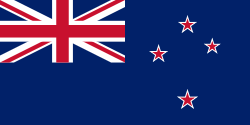| New Zealand at the 1972 Summer Olympics | |
|---|---|
 | |
| IOC code | NZL |
| NOC | New Zealand Olympic and British Commonwealth Games Association |
| Website | www |
| in Munich | |
| Competitors | 89 (82 men, 7 women) in 14 sports |
| Flag bearer | David Aspin (Wrestling) |
| Medals Ranked 23rd |
|
| Summer Olympics appearances (overview) | |
| Other related appearances | |
New Zealand competed at the 1972 Summer Olympics in Munich, West Germany. For the first time at the Olympics, God Defend New Zealand was played instead of God Save the King/Queen. The New Zealand Olympic Committee was represented by 89 competitors, 82 men and 7 women, who took part in 63 events in 14 sports. [1]